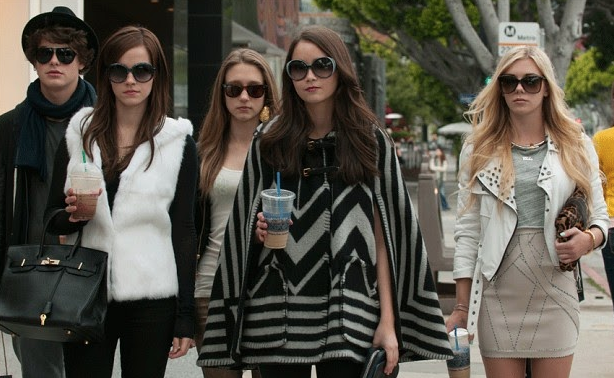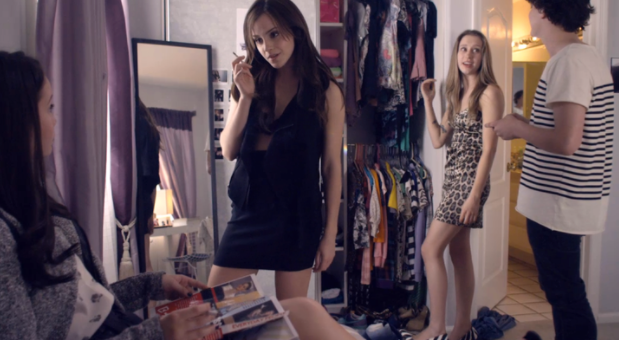by Matt St Clair

After first making her mark as a director with her one-two punch of The Virgin Suicides and Lost in Translation, for which she won the Oscar for Best Original Screenplay and became the third woman in history to be a Best Director nominee, Sofia Coppola’s work has been met with rather mixed reception. Thankfully, the response to her latest feature On the Rocks, which premiered at NYFF, has leaned positive. But this post is dedicated to what is a rather misunderstood masterpiece from the auteur and that is 2013’s The Bling Ring. A fictionalized account of a series of real-life burglaries, The Bling Ring unexpectedly served as a prelude to our recent renaissance of “eat the rich” pictures...
Just last year, pictures like the historic Best Picture winner Parasite, Hustlers, and Knives Out featured protagonists expressing a desire to absorb the wealth of overprivileged folk for reasons ranging from retribution to simply wanting a better life for themselves. The Bling Ring stands out from that recently celebrated pack since the titular gang isn’t necessarily motivated by money. They just want the lavishness that comes with having lots of it. As they look at pictures of their celebrity targets posting selfies of themselves showing off their coveted accessories on their social media pages, they become inspired to rob their houses to obtain these possessions and feel like they’re in the upper echelon of fame and class.
Ironically, the shallow behavior of the central characters proved to be a major point of criticism during the film’s initial release. Although The Bling Ring is meant to show shallow teenagers invading the lives of similarly shallow adults, proving their materialistic quest to indeed be a shallow venture, somehow, the characters’ superficial personalities proved to be a detriment for its detractors along with its seemingly surface-level storyline. Thanks to the intricacies of Coppola’s direction, The Bling Ring offers more than what its sheeny veneer may suggest. For instance, some of the songs used on the soundtrack play like warnings for our main characters that fall on deaf ears.

During the picture’s opening sequence, the group goes on a mansion raid and the song “Crown on the Ground” by Sleigh Bells starts blaring as the credits roll. Vocalist Alexis Krauss sings lyrics that perfectly describe the Bling Ring’s taste of the high life, singing, “You couldn’t care less, you love goodness, you think it’s endless, endless.” The group clearly thinks they can continue their quest without consequences, but as the song’s title suggests, it’s best they set that crown on the ground since their reign will eventually close. Because the screechy melody overshadows Krauss’ vocals, the group doesn’t heed the music’s advice.
As the Bling Ring sits on their temporary, figurative throne, enjoying only the notions of fame and wealth, they even become isolated from each other as they surf on their phones while they’re engaging in their burglary and going clubbing, proving once again that Coppola is a master at capturing solitude. The members aren’t alone in a foreign land like Bob and Charlotte from Lost in Translation nor are they residing in a gated boarding school like the women in The Beguiled. Yet, their lack of camaraderie is proof of the walls they build around themselves.
When they get caught and arrested, it’s especially clear they’re in this scheme for their own respective benefit once Nicki (Emma Watson) turns on them. The one member who appears to be the most shallow turns out to be a skilled manipulator and is played with guileful cadence by an against-type Emma Watson. Worlds away from the Wizarding World, Watson gets transported into the world of Gucci bags and Hollywood mansions as she plays a valley girl keen on climbing up the Hollywood ladder. As Nicki casually says “I wanna rob” during the scene before their first group raid of Paris Hilton’s mansion, Watson’s sly grin signals Nicki’s opportunism.
The Nicki we see there is different from the one in the scene after the opening credits. Right before the film cuts to the main storyline before the arrest, we see Nicki being interviewed by the press as her trial occurs. Nicki puts on a congenial facade, seizing the opportunity to parlay her media exposure into stardom by going on a mea culpa. As Nicki’s goes on about setting a good example by starting a charitable organization and maybe leading a country, she’s saying things she knows the press will salivate over. In addition, the small pauses Nicki makes during her statement indicate how she’s playing up her vapid persona.

As a character, Nicki epitomizes how The Bling Ring is more than what’s on the surface. This "vapid" story of reckless youths breaking into a bunch of mansions is both a fictionalized account of a real-life tale and a commentary on the complicated nature of celebrity culture. Being a celebrity, or at least feeling like one the way the titular group has, can make one feel like the ruler of their own castle. However, much like an actual monarch ruling a country, those who do attain the fame they desire will eventually see their rule come to a close.
The Bling Ring is now streaming on Netflix.